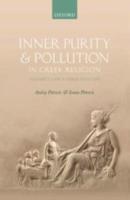
Oxford (2016) h/b 337pp £60.00 (ISBN 9780198768043)
‘Pollution’ has become something of a buzzword in recent studies of ancient religion. Yet this book, whilst building on previous scholarship, turns the focus of pollution (and the related notion of purity) around, by looking at the internal processes at work in the individual worshipper. By this, P./P. mean mainly the mental disposition and thought processes of the celebrant and/or believer. P. /P. also break away from current trends in ancient religion, as they explicitly speak of the notion of individual ‘belief’, a concept from which some historians of Greek (as well as Roman and other ancient) religion tend to shy away. They argue that belief was a large part of the mental disposition necessary for the correct performance of ritual and religious practice, without which said practice would be incorrect.
After a lucid historiographical account of the place of ‘belief’ in studies on Greek religion, alongside an in-depth literature review on pollution from both an anthropological as well as a more traditional classical perspective, each chapter narrows the focus to a different individual author to examine the notions of inner purity and pollution in their work. These chapters are relatively self-contained; they all follow a similar argument and makes similar conclusions—the inseparable nature of external actions and internal thoughts in creating ritual practice but the usefulness of this book comes from the reader being able to dip into whichever author or period on which her research focuses without getting lost.
Part I (‘An Epic view’) contains a single chapter on Hesiod’s Works and Days. This is followed by two parts that reveal the philosophical bent to this book, looking at the pre-Platonic tradition (three chapters on Pythagoras, Heraclitus and Empedocles) and the sympotic setting (two chapters on Xenophanes and the Theognidea). Overall these chapters are strong in utilising evidence that is often quite fragmentary to draw out the above-noted conclusions.
Part IV (‘Inner purity and pollution on the central stage: The evidence of drama’) deals in separate chapters with Aeschylus, Sophocles, Euripides and Aristophanes. Though perhaps more descriptive than the analysis found in the philosophical sections, these chapters still provide an interesting survey of the material. A series of case studies illuminates the ways pollution caused by the characters’ mentalities generates the issues in the plays, for example Phaedra’s ‘impure thoughts’ towards her stepson in Hippolytus.
The final part (‘A different kind of inner purity’) breaks the broadly chronological development of the chapters, and turns to the epigraphic evidence of gold tablets of the rituals commonly labelled Orphism, found from across the time-frame discussed in this book. Here P./P. analyse the importance of a pure mental disposition in these texts, and again its inseparability from physical action in order for a ritual to be correctly performed.
In the conclusion, P./P. perhaps unexpectedly make explicit the linguistic theme that has run throughout the book. In a subsection entitled ‘The language of inner purity and pollution’, they pull together and cross-examine the Greek words used to signal purity and pollution in the texts discussed, such as katharos and miasma respectively, and their usage in the different texts. Whilst this is an interesting examination, it would have been perhaps better as a separate chapter in itself, rather than a subsection of the conclusion.
This survey is useful for anyone grappling with the concepts of religious purity or pollution, or focussing on any of the authors discussed. Volume II is keenly anticipated.
Chris Mowat
